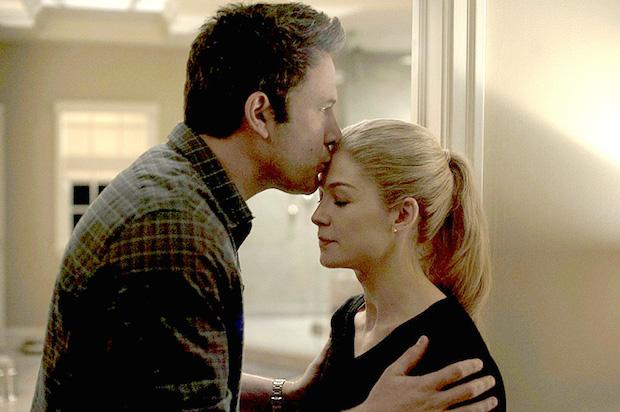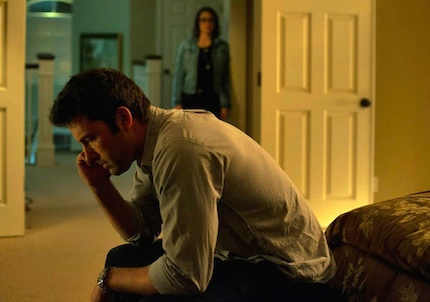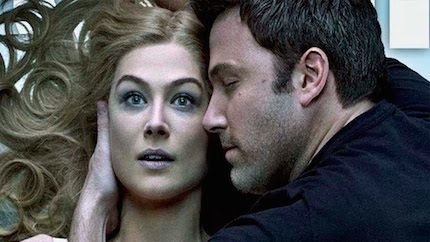Marriage as an apocalypse
Marriage changes us. It brings to light and reveals things that even we didn’t know about ourselves. This is what David Fincher’s film “Gone Girl” is about.
07 AUGUST 2015 · 12:50 CET

The author of the surprising novel “Gone Girl” – taken to the screen by David Fincher, in a film that is already out on DVD– says that the film is about how we tell our story to justify our actions.
It is therefore not surprising that she resorts to something as revealing as marriage, which brings to light the darkest and most shameful areas of our personality.
In “A Heart So White”, Javier Marias describes marriage as a “narrative institution”. What he means is that the other person becomes the recipient of the tale that each person spins of themselves; a tale with its pauses, recurrent themes, weaknesses and deceptions.
Stanley Hauerwas says that “we always marry the wrong person. We never know whom we marry; we just think we do. Or even if we marry the right person, just give it a while and he or she will change. For marriage, being [the enormous thing that it is] means that we are not the same person after we have entered it”.
Marriage changes us. It brings to light and reveals things that even we didn’t know about ourselves. It doesn’t create the problems but reveals them. That is why at times, it brings out the worst in us. In that sense, it can be seen as an apocalypse – literally, revelation–.
THE HEART OF DARKNESS
There is no doubt that Fincher is drawn by dark stories. If there is a constant in his career, it is the study of evil. The book by Gillian Flynn (Kansas City, 1971) fascinates not only by the twists and turns of its narrative complexity but also by what he calls “the heart of darkness”. The author had previously written two novels on themes as sinister as of the murder of children (Sharp Objects) and satanic ritualistic crimes (Dark Places).

Her writing had already received praise from the Master of Horror, Stephen King, but it was with “Gone Girl” that she received the acclamation of North-American critics and the general public, which has bought more than two million copies of her book.
Praised by the prestigious Argentinian critic Rodrigo Fresan, the book was translated into Spanish as part of a collection of noir fiction, which he himself directs for the publishing house, Mondatori.
Not being a stranger to the world of cinema, Gillian herself wrote the script for the film. Her father was a professor of cinema studies and she used to write about films every week for a specialized magazine.
The film was not easy to adapt, not only because it was very long, but because almost all the information is provided through interior monologues. It contains more acts and characters, and it even has four endings, which are rolled into one in the film.
AN IDENTITY ISSUE
“Gone Girl” revolves around the idea of identity. The thing that interests Fincher in Flynn’s novel is the idea that we are all inherently liars. This is difficult to deny when we realize that “we project the best version of ourselves”. The problem is that everyone else does exactly the same thing.
This is a story about the perception of reality. That is why Fincher compares it to “Vertigo” by Hitchcock. Both films have a pivotal moment in which we have to reevaluate what has happened up to that point.
Many see the director of “Seven” and “Zodiac”, as the most obvious heir to the Master of Suspense, given his amazing power to create unease through stories of great narrative complexity, using great visual inventiveness to play out an individual’s vision of the world.

Throughout his career, David Fincher (Denver, 1962) has peered into the most unnerving areas of the human psyche. From “Alien 3” to the television series “House of Card”, his work also includes “The Game”, “Fight Club” and “The Curious Case of Benjamin Button”. Even “The Social Network” manages to highlight some of the most unappetizing corners of the human soul in his far from hagiographic vision of the creators of Facebook, depicted as abominable spoilt brats.
Famous for redoing his takes ad nauseam, Fincher, like Hitchcock, is a master of precision. Kubrick’s perfectionist precision is here combined with Lang’s darkness and the fluidity of the 1970s thriller, with the devastating effects of the films of Lumet or Pakula. If maturing means shedding one’s need to surprise, “Gone Girl” is a work of maturity. It is sober, stark and almost naturalistic, with an intensity that runs deeper than mere pyrotechnics.
EVIL IN YOUR LOUNGE
This is one of those films which, the less you know about, the more you enjoy. The only thing that I can say about the plot is that it is about marriage. Nick (Ben Affleck, whose first impression on screen isn’t that of someone who is going to start smashing up furniture) and Amy (Rosamund Pike, a fairly unknown British actress, chosen because the director was looking for someone that the public would relate to).

As the title indicates, it revolves around a disappearance – Amy’s –, which is investigated by a police woman owing to the apparent signs of violence. We do not know whether she has been kidnapped or murdered but, from the very beginning, the media suspect that the husband is behind it all.
The novel has two voices but in the film we hear her perspective, while the one we see is his, through his behaviour. As both partners are writers, the dialogues are particularly agile and witty; there is a certain sophistication and seduction in its expressivity.
There is nothing predictable about this story. Nobody is who they appear to be. Each character could as easily be to blame as they could be innocent. “Truth and lies are intermingled, according to the interests of the person that is speaking – Boyero observes –; lies and truth, stupefied entrapment and Machiavellian games, emotional blackmail and terrifying feelings, all coexist”.
The ending is of course not a conventional one. The most unnerving thing is that evil doesn’t hide away in the basement, but sits in the lounge.
DOMESTIC SCENES
This is a film that leaves a bad taste in your mouth, as Brett McCracken observes. The way that it presents the truth is so clearly elusive that it becomes revealing. Some see it as a criticism of the current concept of marriage – along with “American Beauty”, or “Revolutionary Road”–, in other words, lacking in lyricism and substance. In that sense, however, series like “Mad Men” or “House of Cards” go further still in the extreme way in which they show its coldness.
Fincher shows a cold objectivity and moral indifference that repulses the religious audience, which tends to adopt a moralistic approach. The problem is that the church’s sentimental message about marriage is far removed from reality.
No one who has been married for more than a couple of weeks would describe it in those terms. In reality, as Tim Keller puts it, it appears as an unsolvable puzzle, a labyrinth in which one feels, quite frankly, lost.

It is interesting that the Bible begins and ends with a wedding – Adam and Eve’s in Genesis, and the wedding of Christ and his Church in the Apocalypse. There is no doubt that marriage is God’s idea (Gn.2), but we see it with the distorted vision of our own experience.
If you come from a stable family, you will be amazed at how hard it is to maintain a lasting relationship, but if you are divorced, you already expect to have problems in your marriage.
Scripture sees marriage as a reflection of the redemptive love of God for us in Christ (Ephesians 5). That is why it is considered a sacrament in the Catholic tradition, although the protestant perspective sees it more as something that serves the common good. The fact is that marriage only works in so far as it comes close to the model of the love of God, who gave himself for us in Christ.
MARRIAGE WILL NOT SAVE YOU
As Keller argues, the reason why marriage can be so painful, but also so marvelous, is that it is a reflection of the Gospel. We are more sinful and imperfect that we would have ever imagined, but we are also more loved and accepted in Jesus Christ than we could have ever hoped to be. We are not saved through marriage but through Christ.
If you are looking to your husband or wife for the thing that only God can give, you are seeking the impossible. Marriage does not give us value or purpose.
We cannot find the meaning of life in the arms of anyone other than Christ. He is the only one who can heal our wounds. It is therefore a tragedy that Churches spend so much time talking about the family, and so little time talking about Jesus Christ.

What is the biblical view of marriage? It is certainly not based on romantic love, but rather on what you are prepared to give up for the other person. Nowadays, people remain united to another person provided that they meet their needs and represent a reasonable cost.
When the scriptures talk about love, they don’t refer so much to what you want to receive from the other, but to how much you are prepared to give him or her. The essence of marriage is a commitment of sacrifice to the other person’s wellbeing. It is based on actions rather than emotions.
ETERNAL LOVE
If marriage is a pact between a man and a woman, “before God”, it is because it is inspired in that supreme love, which reveals God’s Pact. Love in the Bible isn’t the response to a spontaneous desire, but the reaction to a legal agreement, or a promise. It is that security, which allows us to open up and reveal who we really are.
We can allow ourselves to be vulnerable when we do not need to keep up appearances. That is how we can undress, both physically, and psychologically.
If we believe that God’s love exists since eternity in three persons – the Father, the Son and the Holy Spirit –, who know and love each other, then we have been created in his image (Genesis 1:26), to relate to each other.
We shouldn’t therefore be surprised that money, commodities, or the pleasures of this world are unable to satisfy us in the way that only love can do. We seek in the other person the intimacy, constancy, transparence and sincerity that we crave.
Our desire to feel safe with another person, without having to measure our words, and able to be ourselves, reveals a need that only the eternal love of God can satisfy. It is the only unconditional love that exists; any other kind of love depends on what we do or say. That is why God’s love for us in Jesus Christ is the only love that will never let us down.
Published in: Evangelical Focus - Between the Lines - Marriage as an apocalypse
